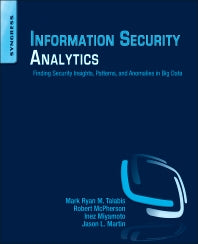Freshly Printed - allow 10 days lead
Couldn't load pickup availability
Information Security Analytics
Finding Security Insights, Patterns, and Anomalies in Big Data
Learn how to use analytics tools and techniques to become the resident security analytics guru in your workplace!
Mark Talabis (Author), Robert McPherson (Author), Inez Miyamoto (Author), Jason Martin (Author)
9780128002070, Elsevier Science
Paperback, published 27 November 2014
182 pages, 30 illustrations
23.5 x 19 x 1.3 cm, 0.53 kg
"...a good how-to guide with plenty of coding examples, to show the reader how to effectively use the tools to make sense of the data they have....the gold-standard on the topic." --RSAConference.com
Information Security Analytics gives you insights into the practice of analytics and, more importantly, how you can utilize analytic techniques to identify trends and outliers that may not be possible to identify using traditional security analysis techniques. Information Security Analytics dispels the myth that analytics within the information security domain is limited to just security incident and event management systems and basic network analysis. Analytic techniques can help you mine data and identify patterns and relationships in any form of security data. Using the techniques covered in this book, you will be able to gain security insights into unstructured big data of any type. The authors of Information Security Analytics bring a wealth of analytics experience to demonstrate practical, hands-on techniques through case studies and using freely-available tools that will allow you to find anomalies and outliers by combining disparate data sets. They also teach you everything you need to know about threat simulation techniques and how to use analytics as a powerful decision-making tool to assess security control and process requirements within your organization. Ultimately, you will learn how to use these simulation techniques to help predict and profile potential risks to your organization.
Chapter 1: Analytics Defined Chapter 2: Primer on Analytics Software and Tools Chapter 3: Analytics and Incident Response Chapter 4: Simulations and Security Processes Chapter 5: Access Analytics Chapter 6: Technical Risk Profiling Chapter 7: Security Intelligence and Next Steps
Subject Areas: Privacy & data protection [URD], Computer security [UR], Data mining [UNF], Data warehousing [UND]


